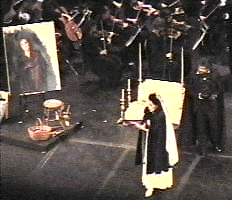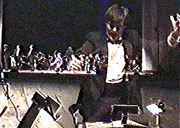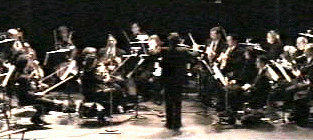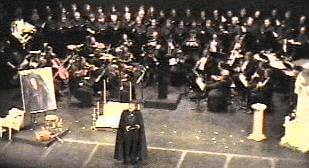 concert versions of such audience favorites as La Boheme, Carmen, Faust, La Traviata, and Rigoletto. Last season, NYCO offered Tosca, featuring Frances Ginsberg as Tosca, in Morristown and at the Bardavon Theatre in Poughkeepsie, NY.
concert versions of such audience favorites as La Boheme, Carmen, Faust, La Traviata, and Rigoletto. Last season, NYCO offered Tosca, featuring Frances Ginsberg as Tosca, in Morristown and at the Bardavon Theatre in Poughkeepsie, NY.
 The presence of the orchestra onstage provides an unusually strong bond with the characters in the opera, allowing for a dynamic interplay of voices and instruments. This fusion of voices and instruments actually heightens the dramatic effect and the minimal use of scenery encourages members of the audience to fill in the background with their imagination. The lighting adds to the musical underscoring, unifying the elements on the stage in an intimate scaling of the production, making the performance personal and immediate.
The presence of the orchestra onstage provides an unusually strong bond with the characters in the opera, allowing for a dynamic interplay of voices and instruments. This fusion of voices and instruments actually heightens the dramatic effect and the minimal use of scenery encourages members of the audience to fill in the background with their imagination. The lighting adds to the musical underscoring, unifying the elements on the stage in an intimate scaling of the production, making the performance personal and immediate.
The New York Concert Opera is in its fourth season of presenting semi-staged concert versions of operas that have received enthusiastic reviews and strong audience support. At the Community Theatre in Morristown, NJ, recently re-opened and converted to a concert hall, NYCO has presented semi-staged  concert versions of such audience favorites as La Boheme, Carmen, Faust, La Traviata, and Rigoletto. Last season, NYCO offered Tosca, featuring Frances Ginsberg as Tosca, in Morristown and at the Bardavon Theatre in Poughkeepsie, NY.
concert versions of such audience favorites as La Boheme, Carmen, Faust, La Traviata, and Rigoletto. Last season, NYCO offered Tosca, featuring Frances Ginsberg as Tosca, in Morristown and at the Bardavon Theatre in Poughkeepsie, NY.
The concept of bring the orchestra into the action as part of the scenic experience is certainly in keeping with current trends of operatic productions. Modern stagings of opera have often disengaged the drama from realistic scenery and have even attempted to shift the action to another time and place than originally intended by composer and librettist. With this trend opera directors attempt to stir the imagination of audience and revitalize operatic performances: To reassert the timelessness of a powerful drama in music. However the effect often may disorient an audience by forcing it to associate traditional operatic characters and periods with a surreal atmosphere that is more decorative than functional. Such extremes often distract the audience and interferes with the enjoyment of the musical context of the opera.
From the singing to the instrumental sonorities, opera conveys its concentration of feelings essentially through the music. No one would contest that it is the singing that invariably provides the most compelling reason for operatic enjoyment. One reviewer has written: "One of the great things about semi-staged opera is the closeness of the singers to the audience".
It is the music that should provide the most lasting impression of any opera performance and NYCO allows for a greater appreciation of the musical values by placing the orchestra on stage with the singers. With the orchestra becoming a scenic part of the performance, the compelling impact of an orchestra concert is combined with the magic of a staged and costumed opera. Orchestra and conductor tend to  fade from initial visual prominence as the audience comes to concentrate on the front-of-stage action from the singers. Consequently, the dramatic elements are not slighted, because the staging allows the audience to understand the characters and their actions. Costumes can be modern or traditional, but are utilized as would be appropriate to the character. Props, as well as furnishings essential to the scenario, and a carefully crafted lighting plot enhance the dramatic representation. When desired, brief, unobtrusive narration between acts compensates for the minimal use of scenery to provide a description of what is heard and seen on stage. As another reviewer has pointed out, the reduction of scenic elements draws "...the audience into the drama more by allowing them to use their imaginations.".
fade from initial visual prominence as the audience comes to concentrate on the front-of-stage action from the singers. Consequently, the dramatic elements are not slighted, because the staging allows the audience to understand the characters and their actions. Costumes can be modern or traditional, but are utilized as would be appropriate to the character. Props, as well as furnishings essential to the scenario, and a carefully crafted lighting plot enhance the dramatic representation. When desired, brief, unobtrusive narration between acts compensates for the minimal use of scenery to provide a description of what is heard and seen on stage. As another reviewer has pointed out, the reduction of scenic elements draws "...the audience into the drama more by allowing them to use their imaginations.".
In keeping with its philosophy of accenting the musical values of operatic tradition, NYCO is dedicated to presenting the finest singers and instrumentalists available in the New York area. Artists having appeared with NYCO have performed their roles with such companies as the New York Metropolitan and City Opera and include sopranos Oksana Krovytska and Frances Ginsberg, tenors Jianyi Zhang, Allan Glassman, Peter Riberi and Raul Melo, and baritones Brian Shexnayder, Robert McFarland, Vernon Hartman and Mark Delavan.
Biography of Maestro Ulrich Hartung
Carmen
"...was certainly one of the best sung in this listener's memory." - Newark Star-Ledger
Faust
"...a truly wonderful production of Faust held the audience enthralled in its magic." - Morris Newsbee
La Traviata
"This combination of staged action and modern dress presented no real problems...the small orchestra (was) focused and full-sounding throughout." -Newark Star-Ledger
"...Verdi himself couldn't have asked for a more empathetic cast. ...One of the great things about semi-staged opera is the closeness of the singers to the audience. ...At no point did (the conductor) or the orchestra distract from the lives being played out at the front of the stage. The musicians played with suitable pathos, poignancy, power, and sensitivity. ...With each production, the quality rose to the near perfect level on May 19. One can only anticipate with excitement the next season". - Morris Newsbee
Rigoletto
"...This was opera at its best with several magnificent vocal performances and a fine orchestra which supported the singers without covering them. The Metro Concert Opera Orchestra was conducted most ably by Ulrich Hartung. They were truly an ensemble, sounding as if they had played and rehearsed the score many, many times. For those in the audience who were not opera "buffs," the afternoon was enhanced by conductor Ulrich Hartung's narrative, explaining the action to the uninitiated prior to the opening of each act. Kudos must also go to the unnamed director. The performance was billed as a concert, but was very cleverly semi-staged and somewhat costumed. (This) lack of traditional 16th-century costumes and sets made no discernible difference in the overall quality of this staging and performance and may have brought the audience into the drama more by allowing them to use their imaginations." - Classical New Jersey
Tosca
"It was a brilliant evening of Puccini with principals from the New York Met and City Opera testing the rafters.... The superb voices and music...engulfed the audience with a truly 'total,' natural sound. What an undiluted thrill to hear opera sung 'up close' in a small, pocket house so reminiscent of what dotted the European continent in the 18th and 19th centuries. At intermission, opera buffs were muttering and wondering how such quality opera had pitched up in Poughkeepsie. At performance's end, the entire assembled rose in a five-minute, standing ovation." - Taconic Newspapers
"Applause was consistently loud and, even better, discerning. There was no set, just a few props and some furniture onstage in front of the orchestra, but it was the music, especially the singing, that galvanized the emotions.... Ulrich Hartung's staging used the whole of the Community Theatre stage and quite a lot else besides, up to and including Tosca's final flight through the basses and her final leap from behind the brass. It was a production both powerful and intimate, as full and engrossing as can be mounted by a hall without an orchestra pit." - Newark Star Ledger
Current Repertoire
Gounod Faust
Puccini La Boheme, Tosca
Verdi Rigoletto, La Traviata
